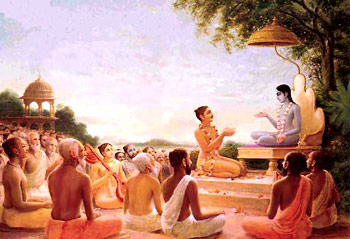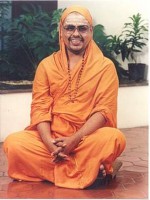Shravanam – Hearing
“Shravanam means exposing myself to the scriptural teaching handled by a competent guide. Because it is unlike the study of another objective literature. If we study the scriptures by ourselves, we end up in information – experience dichotomy. Eternally we would be trapped in search of either information or experience. Therefore if you should not be trapped in this, this teaching should be handled by someone who knows expertly how to handle and remove the orientation of information experience and gives self-knowledge removing self ignorance.

Therefore Shravanam is exposing myself to the systematic teaching or handling of the scriptures done by an expert guide and for a length of time – because orientation breaking takes time. The study has to be systematic because it is a gradual build-up from beginning to end. It should not be a stray study of unconnected topics. It should be systematic in the sense that between one topic and another, there should be a gradual build-up with a connection. It is like building a house where a number of bricks are arranged in an orderly manner well cemented. Only then it becomes a house that can be occupied. But the same number of bricks dumped in one place cannot become a house and we cannot live in that house. And the bricks will be more of an obstacle than a useful thing. Similarly gathering stray ideas by reading books here and there, without building up gradually and without connecting the topics, then our brain will be full of piled up ideas like the piled up bricks and they will be cluttered in the brain. It will not be of any use and will create more problems than benefits. Similarly Vedāntik study will be beneficial only when there is a systematic study.
The study should be continuous. Even in the case of laying bricks, before the cement hardens we should lay the bricks and then some more cement on it and then more bricks before the cement hardens. The whole process should be continuous without gaps and for a length of time.
This Shravanam has to continue for a length of time during which time no questions are allowed. We have to get the comprehensive teaching from all angles in all aspects in its totality. And this process is called Shravanam. Even if you are not able to accept a part of the teaching or have a doubt regarding a particular aspect of teaching, you are allowed to keep aside those questions and doubts and listen with an open mind. You are free to disagree with the teacher. Be patient. Shravanam requires a lot of patience. Never be judgemental or critical.” – Swami Paramarthananda, Introduction to Vedānta (Tattvabodha)
